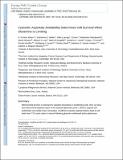| dc.contributor.author | Alkan, H. Furkan | |
| dc.contributor.author | Luengo, Alba | |
| dc.contributor.author | Lau, Allison N. | |
| dc.contributor.author | Lewis, Caroline A. | |
| dc.contributor.author | Vander Heiden, Matthew G. | |
| dc.date.accessioned | 2020-04-29T17:46:38Z | |
| dc.date.available | 2020-04-29T17:46:38Z | |
| dc.date.issued | 2018-11 | |
| dc.identifier.issn | 1550-4131 | |
| dc.identifier.uri | https://hdl.handle.net/1721.1/124929 | |
| dc.description.abstract | Mitochondrial function is important for aspartate biosynthesis in proliferating cells. Here, we show that mitochondrial aspartate export via the aspartate-glutamate carrier 1 (AGC1) supports cell proliferation and cellular redox homeostasis. Insufficient cytosolic aspartate delivery leads to cell death when TCA cycle carbon is reduced following glutamine withdrawal and/or glutaminase inhibition. Moreover, loss of AGC1 reduces allograft tumor growth that is further compromised by treatment with the glutaminase inhibitor CB-839. Together, these findings argue that mitochondrial aspartate export sustains cell survival in low-glutamine environments and AGC1 inhibition can synergize with glutaminase inhibition to limit tumor growth. Alkan et al. show that, under conditions in which cytosolic glutamine is limiting, mitochondrial aspartate export, via the aspartate-glutamate carrier 1 (AGC1), supports cell proliferation and cellular redox homeostasis and that AGC1 inhibition can synergize with glutaminase inhibition to limit tumor growth. | en_US |
| dc.description.sponsorship | Austrian Science Fund (Grant FWF SFB LIPTOX F3018) | en_US |
| dc.description.sponsorship | Austrian Science Fund (Grant P27108, P28854) | en_US |
| dc.description.sponsorship | Austrian Science Fund (Grant W1226 DK) | en_US |
| dc.description.sponsorship | National Cancer Institute (U.S.) (Grant P30 CA1405141) | en_US |
| dc.description.sponsorship | National Cancer Institute (U.S.) (Grant R01 CA168653) | en_US |
| dc.description.sponsorship | National Science Foundation (U.S.) (Grant GRFP DGE-1122374) | en_US |
| dc.description.sponsorship | National Science Foundation (U.S.) (Grant T32GM007287) | en_US |
| dc.description.sponsorship | Damon Runyon Cancer Research Foundation (Grant DRG-2241-15) | en_US |
| dc.language.iso | en | |
| dc.publisher | Elsevier BV | en_US |
| dc.relation.isversionof | 10.1016/j.cmet.2018.07.021 | en_US |
| dc.rights | Creative Commons Attribution-NonCommercial-NoDerivs License | en_US |
| dc.rights.uri | http://creativecommons.org/licenses/by-nc-nd/4.0/ | en_US |
| dc.source | PMC | en_US |
| dc.title | Cytosolic Aspartate Availability Determines Cell Survival When Glutamine Is Limiting | en_US |
| dc.type | Article | en_US |
| dc.identifier.citation | Alkan, H. Furkan et al. “Cytosolic Aspartate Availability Determines Cell Survival When Glutamine Is Limiting.” Cell Metabolism 28 (2018): 706-720 © 2018 The Author(s) | en_US |
| dc.contributor.department | Whitehead Institute for Biomedical Research | en_US |
| dc.contributor.department | Koch Institute for Integrative Cancer Research at MIT | en_US |
| dc.relation.journal | Cell Metabolism | en_US |
| dc.eprint.version | Author's final manuscript | en_US |
| dc.type.uri | http://purl.org/eprint/type/JournalArticle | en_US |
| eprint.status | http://purl.org/eprint/status/PeerReviewed | en_US |
| dc.date.updated | 2020-01-30T18:45:41Z | |
| dspace.date.submission | 2020-01-30T18:45:43Z | |
| mit.journal.volume | 28 | en_US |
| mit.journal.issue | 5 | en_US |
| mit.license | PUBLISHER_CC | |
| mit.metadata.status | Complete | |
